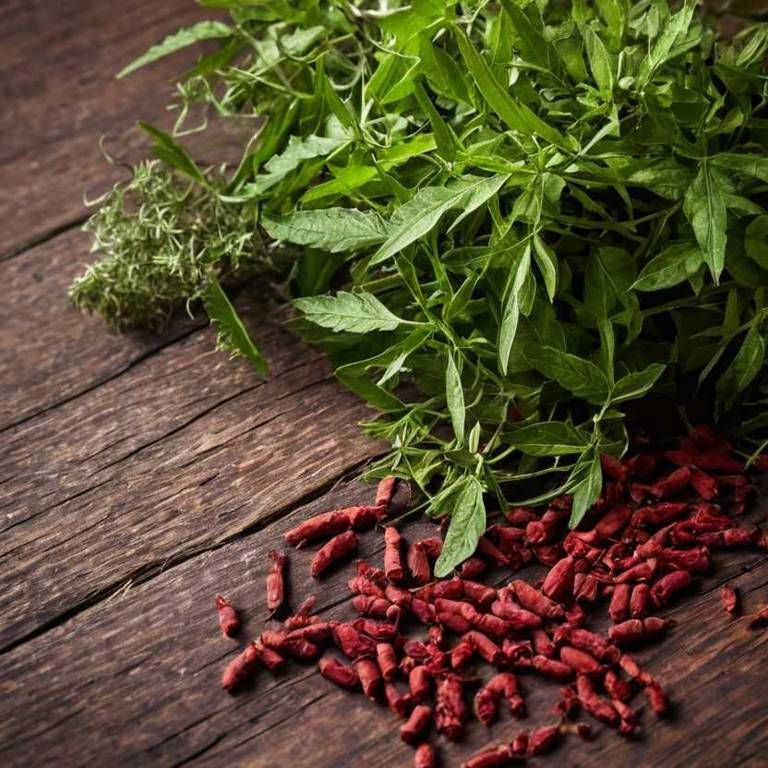By Leen Randell
Updated: Jul 20, 2024
10 Medicinal Constituents Of Rhus Coriaria (Sumach)

Rhus coriaria has active constituents such as gallic acid, tannins, and anthocyanins, which contribute to its medicinal properties.
These compounds have been shown to have anti-inflammatory, antioxidant, and antimicrobial effects. They can improve lives by reducing the severity of allergies and inflammatory conditions, protecting against oxidative stress and cell damage, and combating infections.
Furthermore, the anthocyanins can also possess antidiabetic and anticancer properties.
This article explains in details the 10 best active constituents of Rhus coriaria.
1. Gallic acid
Rhus coriaria gallic acid is a polyphenolic compound extracted from the fruit of the plant.
It has been used for centuries in traditional medicine and as a food additive due to its antioxidant and antibacterial properties. Gallic acid has been shown to possess anti-inflammatory, antiviral, and anticancer activities, making it a promising natural remedy for various health issues.
Its unique flavor and aroma have also made it a popular ingredient in Middle Eastern cuisine.
2. Ellagic acid
Rhus coriaria ellagic acid is a polyphenolic compound derived from its leaves and fruits.
It has been extensively studied for its numerous health benefits, including anti-inflammatory, antioxidant, and antimicrobial properties. Ellagic acid has also shown promise in the prevention and treatment of various diseases, such as cancer, cardiovascular disease, and neurodegenerative disorders.
Its potential therapeutic applications are vast, making it a valuable compound in the pursuit of natural remedies.
3. Tannins
Rhus coriaria tannins is a naturally occurring compound found in its leaves and stems.
These tannins are responsible for imparting astringent and bitter flavors to foods and beverages.
They have been traditionally used as food additives and preservatives to enhance the flavor and texture of various products, such as wines, beers, and soft drinks.
4. Flavonoids
Rhus coriaria flavonoids is a class of plant compounds that are abundant in its leaves and stems.
These flavonoids have been studied for their potential health benefits, including antioxidant, anti-inflammatory, and antimicrobial activities.
They have been shown to possess cardioprotective properties and may help protect against chronic diseases such as cancer and neurodegeneration.
5. Phenolic acids
6. Quercetin
Rhus coriaria quercetin is a bioflavonoid compound extracted from the fruit of the plant.
Quercetin has been extensively studied for its numerous health benefits, including anti-inflammatory and antioxidant properties.
It has been shown to have inhibitory effects on various enzymes, proteins, and cell signaling pathways, making it a potential therapeutic agent in the treatment of various diseases such as allergies, asthma, and cancer.
7. Kaempferol
Rhus coriaria kaempferol is a flavonoid compound that has been extracted from the plant's leaves and fruits.
Kaempferol has been found to possess various bioactivities, including antioxidant, anti-inflammatory, and antimicrobial properties. It has also shown potential in inhibiting cancer cell growth and inducing apoptosis in some studies.
The compound has been used in traditional medicine for centuries, particularly in Middle Eastern and Mediterranean regions.
8. Salicylic acid
Rhus coriaria salicylic acid is a key component extracted from its leaves.
This acid has been used for centuries in traditional medicine and food preservation. It exhibits antimicrobial, anti-inflammatory, and antioxidant properties, making it a valuable compound for various applications. Additionally, it can be used as a natural preservative, reducing the growth of bacteria and fungi in foods and beverages.
Its uses also extend to skincare products, where it helps to soothe and calm skin irritations.
9. Ferulic acid
Rhus coriaria ferulic acid is a phenolic compound that is isolated from its leaves and stems.
This yellowish-white crystal exhibits antioxidant, anti-inflammatory, and antimicrobial properties, making it a potential natural remedy for various health issues. Ferulic acid has been shown to inhibit the growth of certain cancer cells, reduce blood pressure, and alleviate symptoms of asthma and bronchitis.
Its bioactive properties make it an attractive compound for further research and development in the field of pharmaceuticals and food technology.
10. Protocatechuic acid
Rhus coriaria protocatechuic acid is a type of phenolic compound that is extracted from its leaves.
This acid has been widely studied for its various biological activities, including antioxidant, antimicrobial, and anti-inflammatory properties. It has been shown to have potential therapeutic applications in the treatment of diseases such as cancer, cardiovascular disease, and respiratory disorders.
Its unique structure and bioactive properties make it a promising compound for further research and development.